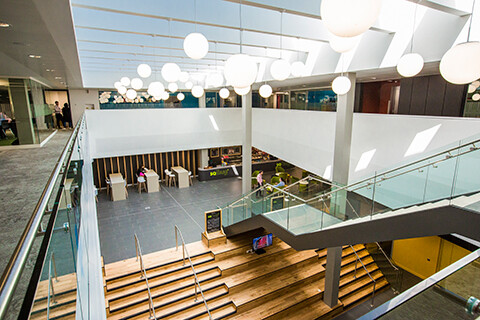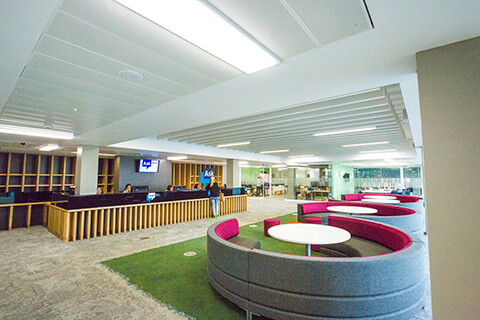
Business with Marketing - BA (Hons)
Currently viewing course to start in 2026/27 Entry.
The success of any business lies in its ability to attract and retain its customers and clientele. Marketing, now more than ever, has the ability to identify opportunities, drive profits and enable businesses to stay relevant in a competitive and forever evolving modern marketplace....
- Level Undergraduate
- Study mode Full Time/Part Time
- Award BA (Hons)
- Start date September 2026
- Fees View course fees
- Subject
- Location City Centre
This course is:
Available with Professional Placement year
Open to International Students
Overview
The success of any business lies in its ability to attract and retain its customers and clientele. Marketing, now more than ever, has the ability to identify opportunities, drive profits and enable businesses to stay relevant in a competitive and forever evolving modern marketplace. Being able to apply these marketing skills alongside a firm understanding of business operations will stand you in good stead for your future career.
Our BA (Hons) Business with Marketing course enables you to develop a wide range of skills specific to both business and marketing disciplines and gain practical skills and enterprising attributes, ensuring you’ll be able to make an immediate impact on businesses.
Utilising innovative and experiential learning, you will develop expertise in areas such as business strategy, consumer behaviour and integrated marketing communications. The course also emphasises an entrepreneurial mindset, qualifying you to identify and capitalise on business opportunities while fostering innovative thinking for successful venture creation.
Emerging technologies such as artificial intelligence and data analytics, employability and sustainability are fundamental to this course to prepare you for a career in the modern business environment. These skills, alongside the opportunity to obtain a digital passport of relevant certificates and accreditations, will allow you to be an innovative, agile and flexible businessperson able to make an impact in an ever-changing environment.
What's covered in this course?
The course gives you a solid grounding in the fundamentals of both business and marketing disciplines while also allowing you to choose areas you wish to specialise in through a series of optional modules. Some of the areas covered include the development and operation of business markets, business strategy and analytics, marketing principles, financial management, consumer behaviour and leadership.
You will learn about the impact and importance of both business and marketing while also gaining a digital passport of certificates and accreditations that are highly valued across all industries. The course will prepare you for a wide array of career paths from large international corporations to small or medium sized enterprises and start-ups.
In addition, you will gain an insight into digital business, exploring how the business world has evolved and uses emerging technology while reflecting on the accompanying issues around social responsibility and ethical behaviour.
Professional Placement year
This course offers an optional professional placement year. This allows you to spend a whole year with an employer, following successful completion of your second year, and is a great way to find out more about your chosen career. Some students even return to the same employers after completing their studies.
If you choose to pursue a placement year, you will need to find a suitable placement to complement your chosen area of study. You will be able to draw on the University’s extensive network of local, regional, and national employers, and the support of our Careers teams. If you are able to secure a placement, you can request to be transferred to the placement version of the course.
Please note that fees are payable during your placement year, equivalent to 20% of the total full-time course fee for that year.
Why Choose Us?
- We have a strong focus on employability and through placement opportunities and our links with local businesses, we aim to ensure you graduate not only with your degree but also with the skills and knowledge needed to embark on your chosen career.
- This course allows you to build a Digital Passport of skills and certificated which are invaluable for employability across numerous industries and careers.
- This multi-disciplined course provides you with the skills and knowledge to open the doors to many careers including business operations, marketing roles and starting and growing your own business.
- We pride ourselves on being the University for Birmingham and supporting and giving something back to the local business community. We have strong links with local businesses in the city across several industries. These links help us enhance students’ experiences by giving them access to industry experts for guest lectures, exciting placement opportunities and other chances to engage with the business community as a whole.
- We aim to infuse learning with exposure to real-world experiences including trips and visits to organisations both in the UK and overseas. In the past, trips have included visits to IWC and Lindt in Switzerland.
Open Days
Join us for our next Open Day where you'll be able to learn about this course in detail, chat to students, explore our campus and tour accommodation. Booking isn't open for the next event yet. Register your interest, and we'll let you know as soon as booking goes live.
Next Open Day: Friday 26 June
Entry Requirements
Essential requirements
Standard offer: 112 UCAS Tariff points. Learn more about UCAS Tariff points.
Accelerate offer: 80 UCAS Tariff points. Find out more about BCU Accelerate.
If you have a qualification that is not listed, please contact us.
Fees & How to Apply
UK students
Annual and modular tuition fees shown are applicable to the first year of study. The University reserves the right to increase fees for subsequent years of study in line with increases in inflation (capped at 5%) or to reflect changes in Government funding policies or changes agreed by Parliament. View fees for continuing students.
Award: BA (Hons)
Starting: Sep 2026
- Mode
- Duration
- Fees
- Full Time
- 3 Years
- £9,535 in 2026/27 ✱ Important note for this price
- Apply via UCAS
- Part Time
- 6 Years
-
TBC
(↩Back to price) * The Government is proposing to apply an inflationary increase to regulated tuition fees for 2026/27 and the University is planning on increasing fees to that maximum level once confirmed.
International students
Annual and modular tuition fees shown are applicable to the first year of study. The University reserves the right to increase fees for subsequent years of study in line with increases in inflation (capped at 5%) or to reflect changes in Government funding policies or changes agreed by Parliament. View fees for continuing students.
Award: BA (Hons)
Starting: Sep 2026
- Mode
- Duration
- Fees
- Full Time
- 3 Years
- £18,570 in 2026/27
Guidance for UK students
UK students applying for most undergraduate degree courses in the UK will need to apply through UCAS.
The Universities and Colleges Admissions Service (UCAS) is a UK organisation responsible for managing applications to university and college.
Applying through UCAS
- Register with UCAS
- Login to UCAS and complete your details
- Select your course and write a personal statement
- Get a reference
- Pay your application fee and submit your application
Guidance for International students
There are three ways to apply:
1) Direct to the University
You will need to complete our International Application Form and Equal Opportunities Form, and submit them together with scan copies of your original academic transcripts and certificates.
2) Through a country representative
Our in-country representatives can help you make your application and apply for a visa. They can also offer advice on travel, living in the UK and studying abroad.
3) Through UCAS
If you are applying for an undergraduate degree or a Higher National Diploma (HND), you can apply through the UK’s Universities and Colleges Admissions Service (UCAS).
You can request a printed form from your school or nearest British Council office. You will be charged for applying through UCAS. Birmingham City University’s UCAS code is B25 BCITY.
Personal statement
The personal statement gives you a crucial opportunity to say why you’re applying and why the institution should accept you.
Here are the three areas you’ll need to address:
- Why do you want to study this course or subject?
Here’s where you explain what makes this course exciting to you. Think about your motivations for studying the course and your future plans. If you’re planning to take a year out, don't forget to give your reasons.
- How have your qualifications and studies helped you to prepare for this course or subject?
This is your chance to show what you’ve learned at school or college. You should include the skills and knowledge you’ve gained from education or training and how this will help you succeed in your chosen course.
- What else have you done to prepare outside of education, and why are these experiences useful?
Not everything you’ve learned comes from the classroom. Life experience counts too! You might want to talk about work experience, employment, or volunteering and how they’ve helped you develop the skills needed for your chosen course or future career.
Worried about Personal Statements?
If you've got no idea where to start or just want to check you're on the right track, we’ve got expert advice and real examples from our students to help you nail your personal statement. You can even download our ultimate personal statement guide for free.

Financial Support
We offer further information on possible undergraduate financial support. This includes the type of loans, grants and scholarships available both from the government and from Birmingham City University.
Course in Depth
First Year
In order to complete this course you must successfully complete all the following CORE modules (totalling 120 credits).
TBC
TBC
TBC
TBC
TBC
TBC
Second Year
In order to complete this course you must successfully complete all the following CORE modules (totalling 100 credits).
TBC
TBC
TBC
In this Business Strategy module, you will explore the key concepts that shape strategy, formation and execution. Comprehensive coverage of topics includes current debates on ethics and resource-based strategy, more classic topics on the external environment, internal environment, including strategic management of business challenges.
TBC
In order to complete this course you must successfully complete at least 20 credits from the following list of OPTIONAL modules.
TBC
TBC
TBC
Professional Placement (Optional)
In order to qualify for the award of BA (Hons) Business With Marketing with Professional Placement Year you must successfully complete the following module.
This module is designed to provide you with the opportunity to undertake a credit bearing, 40- week Professional Placement as an integral part of your Undergraduate Degree. The purpose of the Professional Placement is to improve your employability skills which will, through the placement experience, allow you to evidence your professional skills, attitudes and behaviours at the point of entry to the postgraduate job market. Furthermore, by completing the Professional Placement, you will be able to develop and enhance your understanding of the professional work environment, relevant to your chosen field of study, and reflect critically on your own professional skills development within the workplace.
Final Year
In order to complete this course you must successfully complete all the following CORE modules (totalling 80 credits):
TBC
TBC
The module provides you with an introduction to the main issues of international business. This module deals with the cultural, administrative, geographical and economic differences around the world and how these differences shape businesses today. Three fundamental issues that this module addresses are: (i) the differences among domestic, international and global firms; (ii) the attributes of multinational corporations (MNCs) and finally; (iii) the determinants of success in international business.
In order to complete this course you must successfully complete 40 credits from the following list of OPTIONAL modules.
TBC
TBC
TBC
TBC
TBC
This module focuses on the strategic management issues and decision-making approaches in the context of International Supply Chain and Operations Strategy. You will study different types and levels of strategies and understand the relationship among them. You will also study strategic supply chain decision-making, focusing on areas such as corporate strategy, globalisation, procurement and outsourcing, production and inventory management, international management, and strategic alliances. You will be able to use a range of models, tools and/or techniques to analyse business and operations status and further support strategy development as well as daily operations optimization. The module content also emphasises the ethics and sustainability of supply chain and operations, which is a key theme among modern businesses. Additionally, some new trends and concepts e.g. digital production, e-supply chain, block chain, supply chain resilience will be discussed to open your horizon and prepare you for future challenges.
Download course specification
Download nowEmployability
Enhancing your employability skills
Throughout the programme, you will receive assistance for your own development through co-curriculum activities including dedicated Employability Challenge Weeks and extended induction and transition programmes.
The University has introduced the BCU Graduate+ programme, which is an extra-curricular awards framework that is designed to augment the subject based skills that you develop through your programme with broader employability skills and techniques that will enhance your employment options when you leave university.
Facilities & Staff




Our Facilities
We are constantly investing in our estate and have spent £500 million on new learning facilities.
The Curzon Building
This course is based in the Curzon Building, a £63 million development, located on our City Centre campus.
The building offers students a unique social learning space, including a dedicated student hub incorporating student support services, in the heart of Birmingham’s Eastside development.
The Business floors house an extensive number of IT facilities, breakout areas, and specialised rooms. The Marketing Link Agency is designed to replicate a modern marketing firm, allowing students to get real-life experience of working in the marketing sector. There is also the City Trading Room, which features state of the art stock market tracking equipment, keeping you up to date with all the financial comings and goings of the London Stock Exchange and Wall Street.
The Curzon building is also conveniently close to Birmingham’s business and financial centre, allowing for strong links between your studies and the real world.
The Curzon Building also features:
- An impressive library with access to over 65 million full text items and stunning views of Eastside City Park
- Your Students’ Union which is located in a beautifully restored 19th century pub, The Eagle and Ball
- A modern 300-seat food court with space to study and socialise
- Accessible IT facilities with full Office365 for all students for free
- Shared facilities with the wider campus including the Parkside Building and Millennium Point
Our staff
Mawish Munawar
Course Director for BA Business with Marketing; Teaching Fellow for Entrepreneurship and Innovation
Mawish Munawar is the Course Director for BA Business with Marketing at Birmingham City University and a Teaching Fellow in Management – Entrepreneurship & Innovation. She brings over a decade of academic and leadership experience, specializing in entrepreneurship, innovation, and minority empowerment. Currently pursuing a PhD in Social...
More about MawishDr Colin Akhurst
Lecturer – Strategy and Entrepreneurship
Colin is the associate course leader for BA Business and was awarded his PhD in 2021 for study titled “Facilitating Collaborative Entrepreneurship in an SME Network”. Colin is heavily involved in the Universities Knowledge Transfer Partnerships and Help to Grow initiatives and actively engages with micro and small business in Birmingham and beyond.
More about ColinDr Seray Begum Samur-Teraman
Course Lead for BSc Business and Entrepreneurship
Dr. Seray Begum Samur-Teraman's extensive academic and practical background uniquely positions her as a valuable resource for entrepreneurs and investors in the entrepreneurial ecosystem. In addition to her academic background, she has dedicated years to working directly with entrepreneurs and investors, imparting her expertise and providing...
More about SerayDr Xiping Shinnie
Lecturer in Management and Business (Entrepreneurship & Strategy)
Prior to joining Birmingham City University, Xiping worked at the University of Birmingham, providing teaching and supervision for undergraduate and postgraduate students. Xiping has also worked as a university lecturer at two major universities in China, where she has maintained the academic links, holding current posts as visiting lecturers.
More about XipingDr Linlan Huang
Lecturer in Management
Dr Linlan Huang actively engages in higher education, academic research and professional service. As a business education expert, Linlan has extensive experience in convening and delivering modules at the foundation, undergraduate and postgraduate levels.
More about LinlanDr Dianna Nderitu
Lecturer and Course Leader in Marketing
Dianna is Lecturer in Marketing and the Course Leader for the Marketing course and pathways. Dianna gained a PhD from Coventry University in the areas of Relationship Marketing and Service Marketing. Before joining BCU, Dianna taught at Coventry University Group within the Marketing department. Her current areas of research are in the areas of...
More about Dianna
